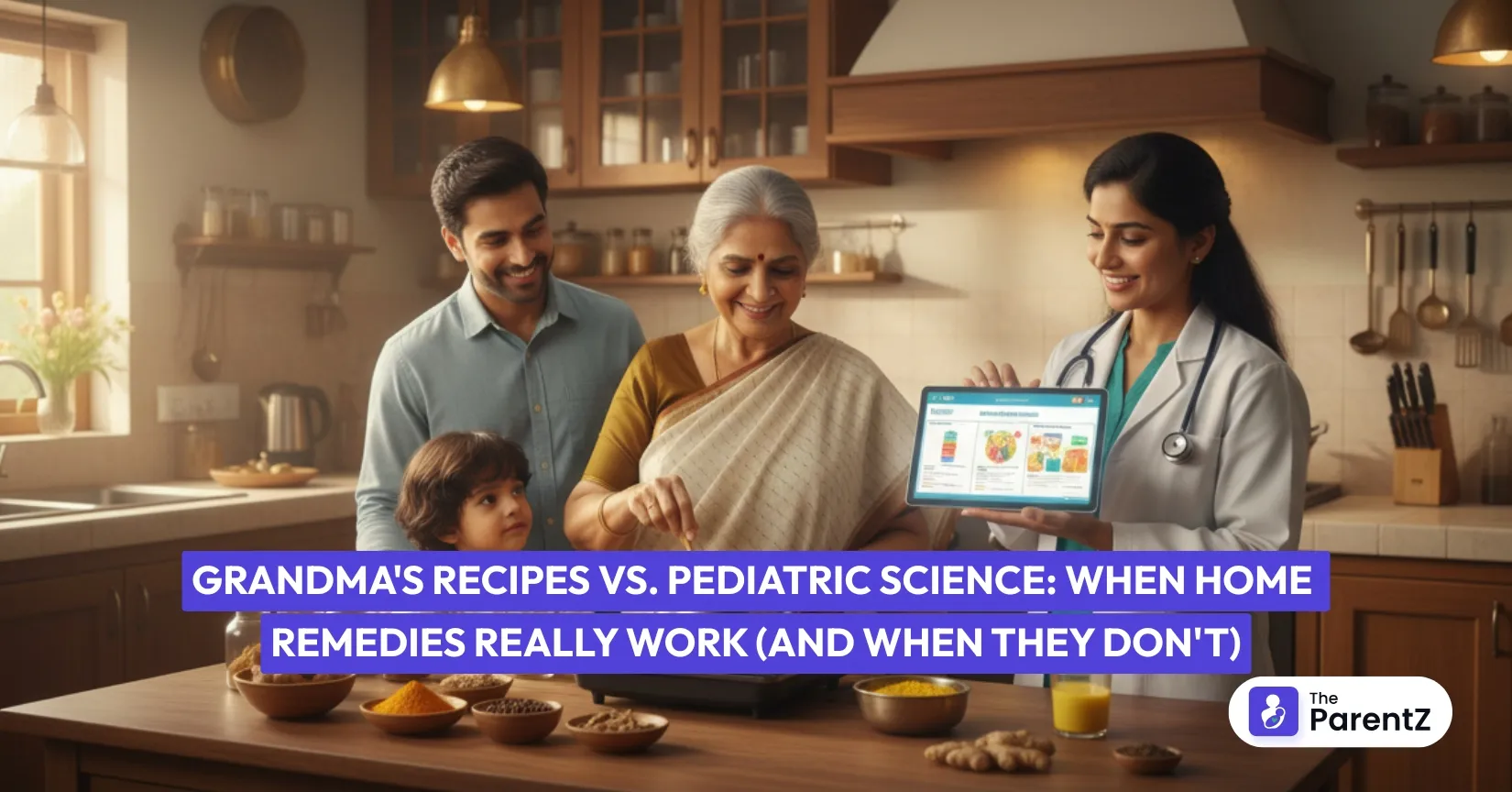Nothing beats the comfort of a steaming bowl of haldi doodh made by grandma when your child catches a cold. Or her homemade concoction of ajwain and ginger for that nagging cough. And most of us have heard, “When you were a baby, this always worked!”
As parents, we often find ourselves stuck in a tug-of-war between the tried-and-tested wisdom of our elders and the carefully calculated advice from our pediatricians. And the pressure can feel very real. You want to do what’s best for your child. But which “best” are we talking about?
Let’s break it down.
The Love and Logic Behind Grandma’s Remedies
Generations before us didn’t have pediatricians on speed dial. Our grandmothers and great-grandmothers relied on kitchen ingredients and instinct. And guess what? Some of those remedies actually do work.
When Home Remedies Can Be Helpful:
- Mild Colds and Coughs: A warm mix of turmeric and milk, honey with ginger, or steam inhalation with ajwain; all these age-old remedies can genuinely soothe your child’s symptoms.
- Stomach Upset: A light moong dal khichdi, jeera water, or a bit of fennel after meals can help calm a gassy tummy.
- Skin Rashes: Coconut oil, aloe vera gel, or a turmeric paste have natural healing properties and can soothe minor rashes or insect bites.
What’s important here is mild symptoms. If your child is eating, sleeping, playing, and just has a little cough or cold, a day or two of grandma’s love-filled care can go a long way.
Plus, there's something so healing about the comfort and attention that come with these remedies. Sometimes it’s not just about the ingredients; it’s the emotional warmth and love that comes with them.
When Pediatric Science Needs to Step In
Now, there are times when things are beyond the reach of home kitchens.
Let’s say your baby has a high fever for more than two days. Or your toddler is coughing so hard they’re gasping for air. Or your child is getting repeated ear infections.
This is not the time to reach for the ajwain pot.
Signs That Medical Attention Is Non-Negotiable:
- High Fever: Especially in infants and toddlers. It could be viral or bacterial, but either way, it needs a doctor’s assessment.
- Breathing Trouble: Wheezing, rapid breathing, or struggling to breathe; go straight to the pediatrician or emergency.
- Rashes With Fever: Could be a sign of infection or allergy. Don’t self-medicate.
- Diarrhea or Vomiting for More Than 24 Hours: Dehydration happens quickly in kids.
- Ear or Throat Pain That Doesn’t Go Away: Might be an infection needing antibiotics.
Modern medicine has tools that grandma didn’t. Blood tests, stethoscopes, and trained diagnoses aren’t a betrayal of tradition; they’re a progression of care.
Finding the Middle Ground
You don’t have to choose one over the other like it’s a boxing match. The best approach? Use both.
Here's how:
Scenario 1: Mild Cold
Grandma: “Give her turmeric milk and cover her chest.”
Doctor: “It’s viral. No meds needed. Keep her hydrated.”
Best approach: Let her rest, use turmeric milk or steam to soothe her, but keep an eye on symptoms. If the fever rises or the cough worsens, you call the doctor.
Scenario 2: Loose Motions
Grandma: “Give him rice kanji and curd.”
Doctor: “Watch for dehydration. Use ORS and avoid dairy.”
Best approach: Give ORS, offer light food like kanji or banana, but skip curd till you know it’s not worsening the problem. If it continues beyond a day, it is doctor time.
Scenario 3: Skin Rash
Grandma: “Apply coconut oil and turmeric paste.”
Doctor: “Could be eczema or allergy. Use prescribed ointment.”
Best approach: Try coconut oil for dry skin, but if it spreads or gets red and itchy, let the pediatrician take a look.
Trust, Balance, and Gut Feeling
You’re not a bad parent for trying a home remedy. You’re not disrespecting tradition by calling the doctor. The trick is to watch, assess, and adapt.
Remember:
- Home remedies are great for comfort and mild issues.
- Science is essential for diagnosis, infections, and emergencies.
- Your gut feeling as a parent? That’s the real MVP. If something feels off, even if the symptoms seem mild, trust it.
Conclusion
Being a parent is hard. You’re managing advice from every direction: elders, doctors, Google, social media, and your own overthinking brain. But here’s the truth: You’re doing great.
It’s not about choosing between grandma or the doctor. It’s about knowing when to combine love with logic. Respect the wisdom, but don’t ignore the science.





Be the first one to comment on this story.